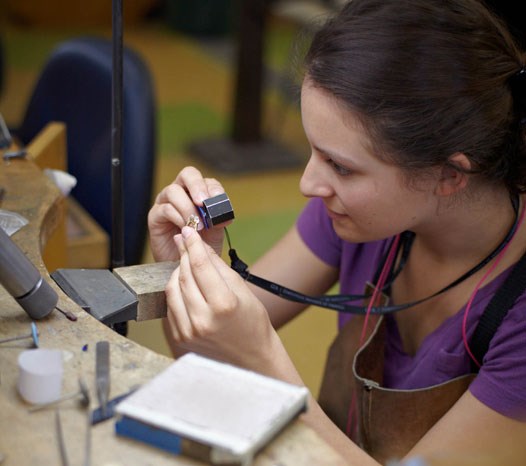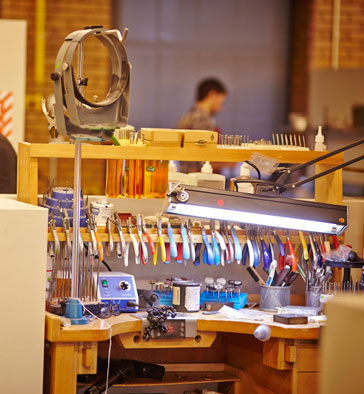Bench Jeweler Shortage Creates Career Opportunities

Categories
Jewelry Making & RepairA generation ago, every town of any size had a jewelry store with window displays filled with rings, necklaces and more made with precious metals and gems.
People would visit their neighborhood store to buy engagement rings and gifts of all kinds. In addition to purchasing jewelry, customers would bring jewelry to be appraised, cleaned, repaired and customized. Some stores would design and manufacture custom pieces as well as sell and repair work. Most stores had one or more bench jewelers, sometimes the owner and often another individual specially trained to work with precious metals and gems.
Beginning in the 1980s, jewelry manufacturing began moving overseas and many retail shops stopped offering bench jewelry services. Individuals who might have pursued bench work as a career looked elsewhere for work. As a result, the jewelry industry lost a generation of jewelry makers. Most jewelry that is imported is what is referred to as fashion jewelry, great as an accessory to an outfit but not something to give as a treasured item to express love or with the intention of it becoming an heirloom.
Today, with the rise of interest in hand-crafted, local products, the desire for bespoke jewelry has risen dramatically. At the same time, the ‘Boomer-era’ generation of bench jewelers are retiring and overseas manufacturing is not as cost-efficient as it once was. These changes have caused a significant need for new bench jewelers in the U.S.
WHAT SKILLS ARE NEEDED TO BECOME A BENCH JEWELER? *
- An eye for detail. Creating jewelry requires concentration and patience. Bench jewelers must pay attention to large and small details on the pieces they make.
- Arm and hand steadiness and control plus finger dexterity. Jewelers must be able to precisely move their fingers in order to grasp, manipulate and assemble very small objects.
- 3-D Visualization skills. Jewelers must imagine how something might look after its shape is altered or when its parts are rearranged. The ability to “see” a design in three dimensions helps.
- Interpersonal skills. Some jewelry makers don’t interact with customers, but given the growth of customized jewelry, an increasing number will need this skill in the future. Still, there are many bench jewelers who don’t interact with customers, especially if their employers hire designers and sales associates to work with customers.
- Artistic ability and a knowledge of popular jewelry styles. This is helpful if you will be working with customers. However, many bench jewelers are not designers, and simply execute designs made by others.
- A strong sense of integrity and honesty. Because many jewelry materials are valuable, being trustworthy is a very important quality in a jeweler.
There are several ways to train to be a bench jeweler but the more professional, hands-on training you receive, the easier it will be for you to move immediately into a good-paying bench jewelry position where you will continue to learn and perfect your skills.
This story is part of the Spring 2015 issue of Benchmarks magazine. See more Benchmarks issues here, or download a pdf of the entire issue.




